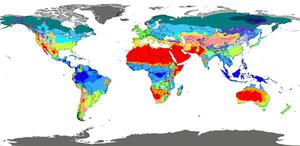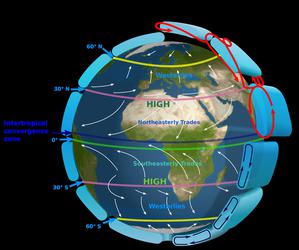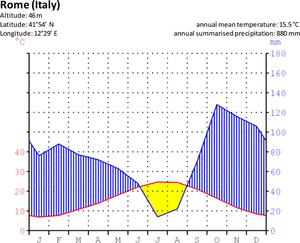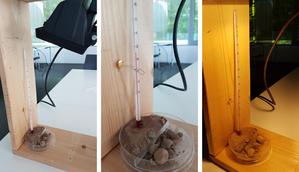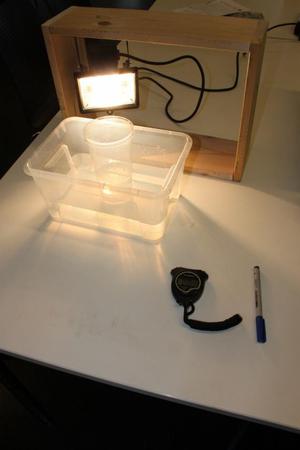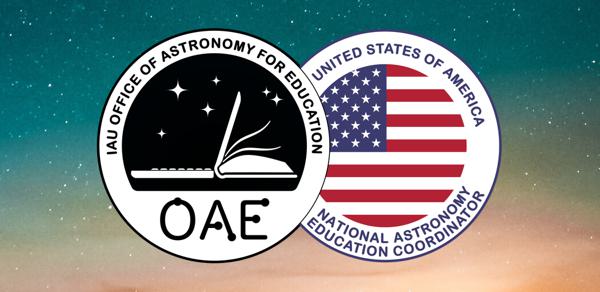Loading...
Related Activities
Continental Climate and Oceanic Climate
astroEDU educational activity (links to astroEDU website) Description: Find out why, in the summer it is cooler by the sea than on the land!License: CC-BY-4.0 Creative Commons نَسب المُصنَّف 4.0 دولي (CC BY 4.0) icons
Tags: Climate change , Climate , Ocean Age Ranges: 6-8 , 8-10 Education Level: Primary Areas of Learning: Modelling , Social Research , Traditional Science Experiment Costs: Medium Cost Duration: 45 mins Group Size: Group Skills: Analysing and interpreting data , Asking questions , Constructing explanations , Engaging in argument from evidence , Planning and carrying out investigationsThe Intertropical Convergence Zone
astroEDU educational activity (links to astroEDU website) Description: The air circulation system: how are winds created?License: CC-BY-4.0 Creative Commons نَسب المُصنَّف 4.0 دولي (CC BY 4.0) icons
Tags: Climate , Updraft , Convection , Winds Age Ranges: 12-14 , 14-16 Education Level: Middle School Areas of Learning: Discussion Groups , Modelling , Social Research Costs: Medium Cost Duration: 1 hour Group Size: Group Skills: Communicating information , Constructing explanations , Developing and using models , Engaging in argument from evidence , Planning and carrying out investigationsThe Climate in Numbers and Graphs
astroEDU educational activity (links to astroEDU website) Description: Learn about climate from data and graphsLicense: CC-BY-4.0 Creative Commons نَسب المُصنَّف 4.0 دولي (CC BY 4.0) icons
Tags: Climate , Average , Climate zone , Weather Age Ranges: 14-16 , 16-19 Education Level: Secondary Areas of Learning: Social Research Costs: Low Cost Duration: 2 hours Group Size: Group Skills: Analysing and interpreting data , Asking questions , Communicating information , Constructing explanations , Developing and using models , Engaging in argument from evidence , Using mathematics and computational thinkingOceans As A Heat Reservoir
astroEDU educational activity (links to astroEDU website) Description: Why do oceans play an important role in mitigating global warming?License: CC-BY-4.0 Creative Commons نَسب المُصنَّف 4.0 دولي (CC BY 4.0) icons
Tags: Life , Climate change , Oceans , heat Age Ranges: 12-14 , 14-16 , 16-19 Education Level: Middle School Areas of Learning: Modelling , Social Research , Traditional Science Experiment Costs: Medium Cost Duration: 1 hour 30 mins Group Size: Group Skills: Analysing and interpreting data , Constructing explanations , Developing and using models , Engaging in argument from evidence , Planning and carrying out investigationsThe Big Meltdown
astroEDU educational activity (links to astroEDU website) Description: Learn what would happen on Earth if all the ice melted!License: CC-BY-4.0 Creative Commons نَسب المُصنَّف 4.0 دولي (CC BY 4.0) icons
Tags: Life , Climate change , Remote sensing , Oceans , Water , Antarctic , Arctic , Ice , Archimedes Age Ranges: 8-10 , 10-12 , 12-14 Education Level: Middle School , Primary , Secondary Areas of Learning: Discussion Groups , Modelling , Social Research , Traditional Science Experiment Costs: Medium Cost Duration: 45 mins Group Size: Group Skills: Analysing and interpreting data , Asking questions , Communicating information , Constructing explanations , Developing and using models , Engaging in argument from evidence , Planning and carrying out investigations